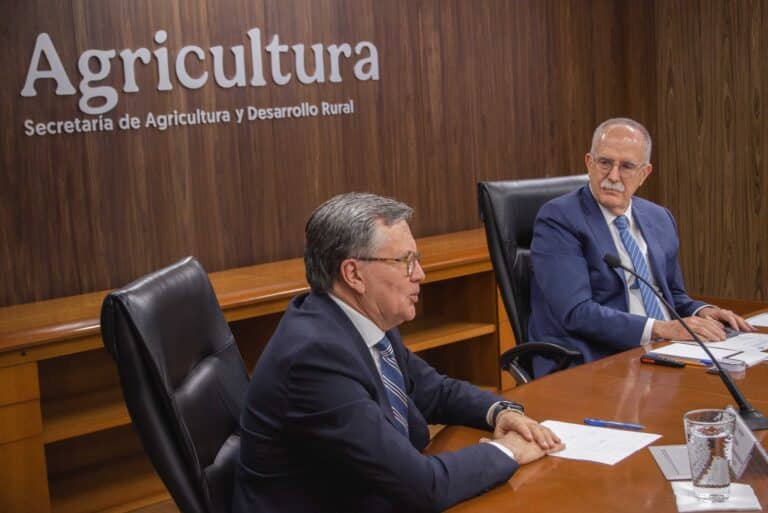The Global Future Council is a network of experts from academia, government, international organizations, business, media and civil society. Membership is for a two-year period and is by invitation only, with members collaborating to identify and disseminate innovative ideas with the potential to create a global impact.

Santiago de Chile, 14 April 2023 (IICA) – Manuel Otero, Director General of the Inter-American Institute for Cooperation on Agriculture (IICA), participated in an introductory session of the Global Future Council, a World Economic Forum (WEF) initiative, which he was invited to join. The forum brings together international leaders in various disciplines to promote innovative thinking on courses of action that humans should explore in seeking to create a more resilient, inclusive and sustainable world.
The Global Future Council is a network of experts from academia, government, international organizations, business, media and civil society. Membership is for a two-year period and is by invitation only, with members collaborating to identify and disseminate innovative ideas with the potential to create a global impact.
Making his first appearance at the forum, Otero stressed the role of the agriculture sector of the Americas in the new global agenda and highlighted its primary contributions to food, nutritional and environmental security. Here, he pointed out that Latin America and the Caribbean—a region that is home to only 8% of the global population—is also the world’s largest net food exporter and main provider of ecosystem services.
He also stressed the importance of devising a new generation of public policies, grounded in science and innovation, which will also equip farmers with new tools, for example, by digitalizing their activities.
The network of experts is divided into 29 thematic councils, focusing on the main challenges facing humanity. Some of the issues include Energy Transition, Artificial Intelligence, Cybersecurity, Job Creation, Responsible Investment, Financial Systems, Technology Policy, Geopolitics and Philanthropy for Climate and Nature.
Specifically, Otero will sit on the Global Council on the Future of Food and Water Security for the March 2023 to December 2024 period. The availability of healthy food and safe water for present and future generations are key issues on the current agenda of global leaders.
It is hoped that the experts will offer strategic perspectives, scientific evidence, leadership and a multidisciplinary understanding of the main problems threatening food and water security.
The Council’s mission is to discuss strategies to enable technological innovations to serve as a catalyst for actions and policies that will ensure that humanity’s food- and water-related needs are met in a world whose population will reach 8.5 billion by 2025.
One of the critical issues raised in the Council is the approach of mechanisms to facilitate the funding of agrifood and water system transformation. The network is fully embedded in the key centers and platforms of the World Economic Forum, ensuring that its work is developed alongside communities and alliances in a position to convert ideas into action.
The Global Future Council on the Future of Food and Water Security will capitalize on the research undertaken by the Center for Nature and Climate of the World Economic Forum.
In 2021, Otero, as the IICA Director General, was instrumental in achieving an unprecedented consensus among the countries of the Americas with respect to the commitments and measures needed to transform the world’s agrifood systems, which the region then presented at the United Nations Food Summit that the UN Secretary General convened in New York in September of that year.
The consensus was expressed in a document with 16 messages that emphasized the role of farmers and agrifood workers as indispensable food system actors and warned that without agricultural production there would be no raw material to transform into food.

Last year, IICA again organized a regional debate that culminated with the countries arriving at a joint position to take to the United Nations Climate Change Conference (COP27) in Egypt in November. There, the countries reiterated that in order to create a more sustainable agriculture sector, climate action should be science-based, while safeguarding and boosting productivity, rather than exacerbating the already troubling ongoing food crisis.
The members
Usha Rao-Monari, Undersecretary-General and Associate Administrator of the United Nations Development Program (UNDP); and Ranveer Chandra, Managing Director, Research for Industry and Chief Technology Officer, Agri-Food at Microsoft, will co-chair the 2023 and 2024 Global Council on the Future of Food and Water Security.
Other Council members, along with Manuel Otero, are as follows:
Arturo Condo, President, EARTH University
Cao duc Phat, Chair of the Board of Trusteees, International Rice Research
Ezgi Barcenas, Chief Sustainability Officer, Anheuser-Busch InBev
Rejane Souza, Senior Vice-President, Global Innovation, Yara International ASA
Chris Armitage, CEO, Global Evergreening Alliance
Sofia Sprechmann, Secretary General, Care International
Sandhya Sriram, CEO and Co-founder, Shiok Meats
Gina Domanig, Founder and Managing Partner, Emerald Technologies Fund
David Chen, CEO and Founder, Equilibrium Capital Group
Joyeeta Gupta, Professor of Environment and Development in the Global South, University of Amsterdam
Parameswaran Iyer, Executive Director for South Asia, World Bank
Santosh Jayaram, Senior Vice President and Global Head of Sustainability, HCLTech
Marcel Beukeboom, Permanent Representative of the Netherlands to the FAO
Razan Al Mubarak, President, International Union for Conservation of Nature
Rhett Butler, President and Founder, Mongabay
Estrella Penunia, Secretary General, Asian Farmers’ Association for Sustainable Rural Development
Chen Zhigang, Dean, China Academy for Rural Development (CARD)
More information:
Institutional Communication Division.
comunicacion.institucional@iica.int











